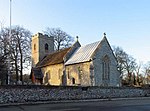Trinity Broads
Norfolk BroadsSites of Special Scientific Interest in NorfolkSpecial Areas of Conservation in England

Trinity Broads is a 316.8-hectare (783-acre) biological Site of Special Scientific Interest north of Great Yarmouth in Norfolk. They are in The Broads Special Area of Conservation. They are also part of the Broads National Park in Norfolk, England, comprising 5 broads in total. The three largest are Rollesby Broad, Ormesby Broad and Filby Broad, and there are two much smaller broads named Lily Broad and Ormesby Little Broad. They are managed by the Broads Authority.The Trinity Broads are on a tributary of the River Bure, but there is no navigable link to the main river system, and they are therefore virtually undisturbed.
Excerpt from the Wikipedia article Trinity Broads (License: CC BY-SA 3.0, Authors, Images).Trinity Broads
Main Road,
Geographical coordinates (GPS) Address Nearby Places Show on map
Geographical coordinates (GPS)
| Latitude | Longitude |
|---|---|
| N 52.676 ° | E 1.643 ° |
Address
Main Road
Main Road
NR29 3LS , Ormesby St. Michael
England, United Kingdom
Open on Google Maps









